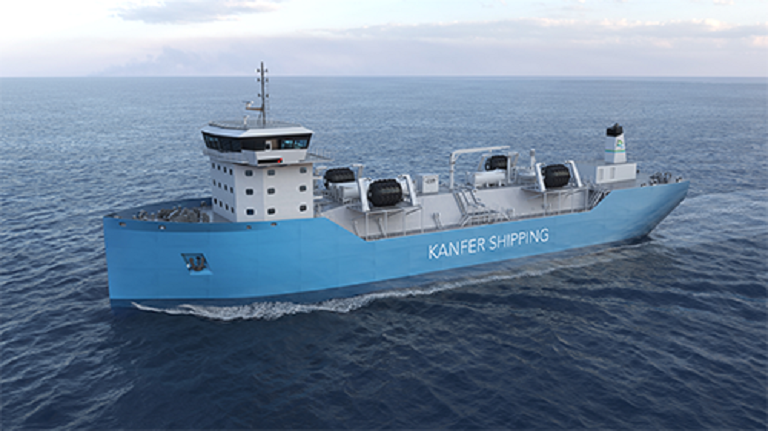More than 20 000 ships are transiting the Suez Canal annually and all ships have waiting time before the daily convoy commences
Egyptian Natural Gas Holding Company (EGAS), Kanfer Shipping (KANFER), and Leth Suez Transit (LETH) are facilitating a strategic and competitive LNG bunkering hub in the Suez Canal.

EGAS, KANFER, and LETH signed an MoU on 3 February 2022 with the purpose of establishing LNG bunkering services in Egypt’s Mediterranean, the Suez Canal, and the Red Sea.
The parties have agreed to collaborate and establish a joint venture (J/V) that will be chartering a bunkering ship from KANFER and managing its daily operation in Egypt.

Egypt is a strategic location for international shipping and will be an important location for LNG bunkering calls between Europe and Asia. It is also important to make environmentally friendly fuel available for the maritime industry in the inner Mediterranean and in the heart of the Middle East.

“Himalaya Shipping, with its 12 dual-fuel Newastlemaxes under construction, is pleased to see such an initiative to establish an LNG bunkering hub in the Suez Canal.
To make LNG available in strategic important areas is imperative for our company in our efforts to meet our target to transport dry bulk commodities with lower emissions at a competitive price for our customers,” says Herman Billung, CEO, Himalaya Shipping.
More than 20 000 ships are transiting the Suez Canal annually and all ships have waiting time before the daily convoy commences.
This time can be utilized efficiently by replenishing bunkers in either Port Said or Suez. There are also important ports along the Egyptian Mediterranean coast where ships will need LNG bunkering.
There is an increasing number of dual-fuel ships in order (511 ships), in addition to the current fleet of 304 ships according to DNV.
Even in today’s volatile energy market where oil products are favorably priced to LNG, more dual-fuel ships are being ordered and more LNG bunkering ships are required.
One of the key advantages of Egypt as an LNG bunkering location is that Egypt has natural gas resources and liquefaction facilities which put them in a unique and competitive position among the key LNG bunkering hubs of the world.

”The key LNG hubs of the world must import the LNG to their terminals which adds considerable cost to the end-users. We are confident that the J/V can provide competitive prices for the key ports and hubs such as Singapore and ARA.
We believe that this will attract shipowners and influence their decision-making on where they will replenish LNG”, said Managing Partner in KANFER, Stig Hagen.
There are three sources for LNG in Egypt namely Damietta, IDKU terminal, and the FSRU stationed in Ain Sokhna. This gives flexibility and more opportunities for LNG bunkering in both Port Said and Suez.
EGAS has initiated the establishment of a J/V with the right value-adding partners. The J/V will charter the bunkering ship, and take care of the administration including the daily operation of the ship.
This entity will also purchase the LNG from EGAS (or other LNG sources) and trade them to ship owners and the maritime industry.
EGAS has made it clear that they are able to allocate a substantial volume of LNG to this growing segment in order to make the shipping industry, Suez Canal, and Egypt greener.
“This will be an important step for Egypt and attract more business to the Suez Canal”, said Admiral Osama Mounier Mohamed Rabie (Chairman & Managing Director) in the Suez Canal Authorities.
KANFER has a design enabling liquid gas transportation with the lowest possible environmental footprint as well as focusing on reducing the infrastructure cost.
LETH and KANFER Shipping are now primarily seeking J/V partners that have experience with bunkering and/or commodity trading and can take an active part in creating a business model for this high potential and attractive project in Egypt.
The parties have in mind creating a fast-track solution and have the ambition to have the bunkering infrastructure in operation by the latest 2025.














